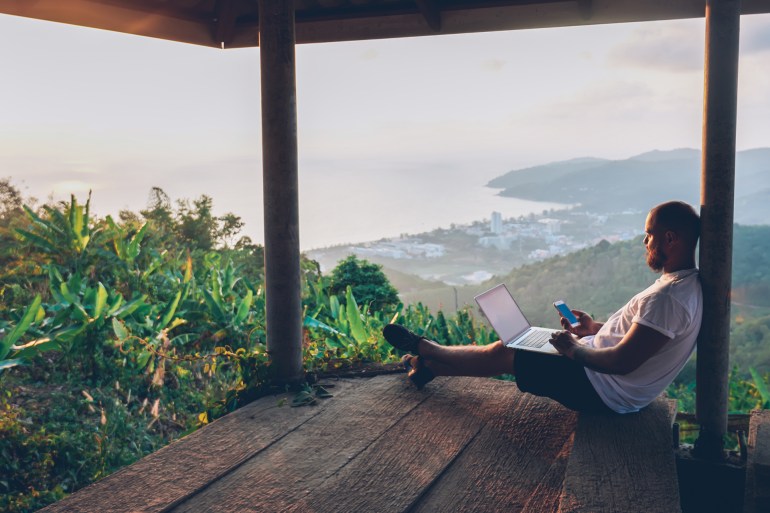Working from home has opened the door to working from anywhere where there is a good browser and a better internet network, to display remote communication applications such as “Zoom”.
The writer Nikki Eckstein explained - in a report published by the "Japan Times" website - about working from home and how it is changing the way of traveling permanently, noting that this contributes to the prosperity of the travel industry and revitalizes the movement of travel worldwide.
The new situation has made it easier for remote workers to travel more frequently and for longer periods (Shutterstock)
travel and work
He added that the office's more flexible policies on attendance meant that many workers could travel at any time, even during busy workweeks, as long as they could get their work done from far away.
He pointed out that the new situation made it easier for people to travel more frequently and for longer periods, and sometimes encouraged them to open new destinations, and that this greatly helped airlines to compensate for lost traffic during the Covid-19 closures.
Chris Lehane, global head of policy and communications at Airbnb Inc., a short-term rental housing company for travelers and others, was quoted as saying that deregulation “isn't just a trend, it's permanent. It's a permanent pattern and it was eventually going to happen with Society has progressed, even without a pandemic."
Communication apps
Lehan described the emergence of technologies that have transformed travel, such as telematics applications, as perhaps more important to travel than steam trains or commercial flights, adding that the entire architecture of travel is in the midst of change now.
The writer said that this is the reason why large companies in the travel trade describe the continuation of remote work as the biggest change maker in travel for 2022.
Telematics applications have transformed the entire architecture of travel and work (Shutterstock)
More trips
The writer talked about how this affects our own experiences after the end of the pandemic, according to the travel industry forecast for 2022 from Deloitte, people who intend to fit work with their trips will travel twice as much as those who wait for vacation time.
Eileen Crowley, Deloitte's travel pioneer, says telecommuters spend more.
Kayak CEO Steve Hefner agrees, "When you work from anywhere, it means more leisure travel. If you're free from the office, you can go to a lot of other places."
travel experiences
The writer goes on to enumerate the changes to travelers' experiences, saying that being able to work where your family wants to go means you can now organize your work life and your family at the center, rather than working with your family around your job.
This also benefits hotels and destinations, as they become less dependent on the very busy peak periods that are traditionally seen as good times to travel, for example, the school holiday weeks.
Stays are getting longer too;
In a report that included the latest data, the length of stays in 2021 increased from 2019 by 40%.
Accommodations will race to meet the needs of the remote traveler with special offers for long-term stays (Shutterstock)
Your hotel may look different
And with remote workers representing a whole new market for the travel industry, accommodation providers will be racing to meet their needs, if they haven't already.
For laptops, home rentals have the upper hand, says the writer, because they provide space to distribute and separate work from play.
The startups, which charge users $199 a year for access to a global array of rental options for a month, have sprung up to meet the demand of "digital nomads".
Hotel companies are trying to get back into that area as well;
For example, Citizen M has created a membership program that offers fixed nightly rates and discounts on food and beverage offerings when digital nomads commit to a month's stay;
Its price usually reaches $1,500 per month even in expensive real estate markets, such as New York, Amsterdam or Paris.
Free Wi-Fi in hotels will no longer be considered a luxury (Shutterstock)
Hoxton hotels have announced special rates for travelers who need to stay overnight close to the office, while Mandarin Oriental in Washington, DC is among the hotels offering daily rates for working from home, looking for extra space. .
And more will surely follow.
Elsewhere, hotels are rethinking the old business center;
Some convert pool cabins into indoor and outdoor workstations, or add a wide range of office supplies (and printing services) to a standard room office.
Meanwhile, resorts in luxury destinations are moving to include home offices and other flexible spaces that can be outfitted with, for example, fitness equipment or nursery equipment.
The new buildings will be designed to have fewer boxy rooms and more spacious suites.
Free Wi-Fi will no longer be considered a luxury.

